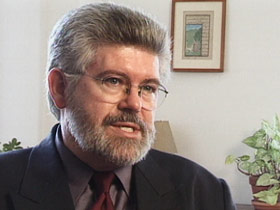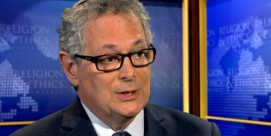In This Episode << SLIDE LEFT TO SEE ADDITIONAL SEGMENTS
Lewis Rambo Extended Interview
Read excerpts from R & E’s interview with Lewis Rambo, author of the book UNDERSTANDING RELIGIOUS CONVERSION:
LEWIS RAMBO: Defining religious conversion is one of the most perplexing and difficult tasks of the scholar, as well as of religious people. There are so many different aspects of conversion that have to be taken into account, and different religions define conversion in different ways.

Converting to Judaism is seen as a very intellectual task or process. One seeks out a rabbi. One learns Hebrew. One goes through a process in which, in many cases, the rabbi will actively discourage the person: “What? Why do you want to become a Jew?”
At the other end of the spectrum are evangelical Christians who are eager to have you come in, who invite you in and try to persuade you to become a Christian. For Jews, it would be a much more intellectual, behavioral transformation, [with] cultural changes. But for some Christians it might be a very emotional experience — a person struggling with guilt, with meaning in life might be told by an evangelical Christian, “Invite Jesus into your heart.”
Traditionally, conversion meant a dramatic, sudden transformation. It was often received as a passive experience — “God came into me and made this happen,” not a rational process — “I”m searching and changing behavior, changing attitudes.” Defining conversion is a very difficult and onerous task, I’m afraid. In my research over the years, I have found that the paths to conversion are remarkably diverse. A Jewish woman in California went to a worship service because her boyfriend, who was not a Christian or a Jew, happened to be an organist at a Catholic Church. Once she was at this Church, something captivated her. She had no idea why it was so appealing to her, but that began the path.
One Jew doing his Ph.D. began to read, as an academic, the works of Augustine. He studied Augustine and then the Confessions, as well as The City of God, and it became an intellectual journey that he did not want or invite. But he was drawn into this somehow by the power of Augustine and his thinking.
One woman was taking a bath, and a radio that had been plugged into the wall fell into the bathtub. She thought she was going to be electrocuted and die. But she believed (and she had no previous interest in religion at all) that God lifted her out of the bathtub, sat her beside the bathtub, and saved her instantaneously. That experience triggered her to read the Bible insatiably for the next few months, as though she had been starving in the desert for years. And then she became an evangelical Christian.
Another person I interviewed at one point told me that he had taken some bad drugs. He had taken drugs for many years, but in this particular case, he was absolutely terrified. Something had gone wrong. He went into the bathroom, looked in the mirror, and saw this monster. He cried out instinctively, “Help me, Jesus.” Then he felt a hand on his shoulder that he believed was Jesus, miraculously coming to heal him.
The point is that the paths are stunningly different — drug experiences, dreams, friends, a random comment. And, of course, many converts say that God intervened in a way that would get their attention and draw them to God.
There are not many things that scholars of conversion agree on. But one thing they do agree on is that most conversions — not all, but most — take place through kinship and friendship networks. In other words, most scholars believe that through a connection with another human being, converts come to have a different view of the world, a different view of self, and a different view of God, or the Divine, or the spiritual world. There is something about us human beings that we need to be able to trust someone, and the message from a trusted friend often has more impact, because we are rooted in a world in which we want someone we can trust, who can then lead us or guide us into a new way of living.
The other generalization that can be made — and again, it is not a hundred per cent — is that often some kind of crisis triggers a new way of viewing things: a death in the family, failure in business or, paradoxically, even success in business. I often have people tell me that [conversion came] at the point in their lives when they had achieved every goal they had, but were still not satisfied: “Is that all there is?” So then they began a search. Often they would look at religion or their past or their spiritual orientation in the past and say, “This did not work for me. I want to try something new, something different.”
Taking on a religion can be a way of burning bridges and establishing a sense of independence. But when the original motivation is just the immaturity of rejecting parents or the past, then the occasion for the conversion is rarely what sustains the quality of the conversion later on. Motivations change. Someone might fall in love with someone else merely because they were good looking, and there was a great sexual attraction. But then later on, if the marriage or the relationship lasts, it is because they come to know the person, trust the person, love the person in a way that is not just sexual and for the moment. Romantic passion is transformed into something that is much more lasting. I see that a lot in conversion. One of the parallels to conversion that many people have drawn is the experience of falling in love.
In the past, people would talk about conversion as being sudden and dramatic. The influence of the conversion of Saul of Tarsus to Paul the Apostle is paradigmatic, whether people know much of the Bible, whether they are Christians or Jews. Everybody knows about Paul. But most of the research now shows that conversion, while having dramatic events within it, is a process over time. Even Paul or Saul had preparation to his conversion.
In my research, I have devised a model of this sequence of events, and I talk about context. What is the milieu in which a person’s spiritual journey begins? The actual beginning is often a point of crisis. Something bad happens. Or, in some cases, there is a mystical experience. Or something so good happens [so that] they want to thank someone: “Whom do I thank for this wonderful bit of good fortune?”
The crisis often triggers searching, or what I call the quest. The quest then often leads someone to an encounter with a missionary or rabbi or teacher or just someone in the workplace. It is as if we have radar working in our lives to find someone who can help us. Most converts will talk about someone who is a guide, or a teacher, a guru. That process leads to interaction. The interaction phase is more focused on what it means to be a new spiritual being. In some cases, they need to learn how to pray. They need to learn how to study the Bible or scriptures. Then the process reaches the point of the commitment. In traditions that require a radical break, commitment often involves rituals that burn the bridges from the past. But in other traditions (and in our tolerant American environment), rather than repudiating the past, you affirm a new identity (without necessarily negating the past) by saying that God was even at work in that. You then have rituals that create a new identity, a new set of relationships, a new set of roles that lead to a new and different kind of life.
Then there is the consequences stage. For some people, the conversion doesn’t take. Lots of people go through many different religious combinations and permutations and don’t stay in one particular one. For others, though, over a period of time they begin to see their lives transformed, and that transformation can take place emotionally and intellectually. Their lives can be changed in many different ways, and at that point, if the changes are perceived by the person as good, that consolidates the conversion process so they then become a life-long Jew or Christian or Catholic or whatever they happen to be.
It is important to distinguish between an outsider’s view of conversion and the insider’s view. Much of what I’ve tried to say and much of what I’ve written in the past had to do with psychology, sociology, and anthropology, or viewing from the outside — making generalizations, understanding cultural factors, personal factors, and so forth. And all that is very good. But the insider’s point of view must always be kept in mind — that the experience of conversion, at its deepest level, is a profound and pervasive reorientation of one’s entire life, starting in many cases with self image: Who am I as a human being? Who is God? What is the nature of reality? People who are serious converts, people who really explore this in depth and whose lives have been transformed will look profoundly different from merely changing labels, changing hats, changing rituals, but rather a deep reorientation that goes to the very foundation of who they are as human beings.
All of the religious traditions, at their best and deepest, say that conversion or spiritual transformation is a process that makes a person different: What are my goals? What are the ways in which I live? How do I relate to people? How do I relate to God? How do I relate to death? Those things are transformed in the spiritual journey that we call conversion.
In the United States, we have a wonderful situation. The tolerance in our society provides what I call “the ecology of conversion.” The ecology of conversion allows for people to examine different options: What is best for me? What is true for me? This has dangers of becoming too private, but the good thing about it is that it does allow people to search for a relationship with God or the Divine in a way that makes them feel at home. God is truly meeting them where they are.
One danger is that people become entranced with their own private perceptions of what is good. One of the crucial things that religious tradition teaches us is that we need a community. Communities can guide and nurture, but they can also help us discern when we may be a little bit too weird in our own private orientation to religion, or that we can simply use God for our own purposes. Many years ago, a writer described God as being “in a box” for many people: “God is there for my purposes. God is kind of a cosmic bellboy who does my bidding.” All the religious traditions teach that God is not for my personal gratification but, rather, for personal transformation, so that I can make a contribution to the wider society, serving the needs of those who are poor and oppressed.
Many of the people I’ve talked over the years have said that they have never been so happy, that they have found a home or a sense of roots or connection. In many cases, they will report, “I am no longer afraid. I am not afraid of dying. I am not afraid of what people think of me. I am not afraid of guilt, because it can be transformed by God’s forgiveness.” All these things just unleash the energy of people. Often sheer exuberance is a result of the conversion process.
Some people have one, and only one, conversion in their lifetime. But in the last fifteen years or so, it is not uncommon to meet people who have a series of conversions. In fact, the literature even talks about some people being the “convertible” type-people who go through one conversion after another after another. My interpretation is a little bit different. I see these people as very serious “questers,” and they go through these [conversions] because they want to find the religious path that is best for them — or, in theological terms, the path that is true. That may lead them through several different options.
Lots of people in the past would say, “I have found the Truth. This is it, this is God’s will.” More recently, I have the sense that people’s interpretation of Truth is “It is true for me. It is true, as I understand it. It fits my orientation to life better.” Many scholars describe this as post-modernity: We live in a time when there are no absolutes. Of course, this creates all kinds of conflicts within religious traditions, because many would say, “No, we have the Truth.” The relativistic approach can deviate into personal approaches that just say, “It is true because it feels good for me, and that’s it.”
Conversion research shows that often people have experiences that are appropriate to the particular group that they may be converting to. It is not unusual for some conservative Christians, or people who want to become orthodox Christians, to have experiences that people within that tradition will then validate and say, “Yes, you are a legitimate convert.” People who convert, say, to Judaism or mainline Protestantism rarely report mystical experiences, visions, dreams, or whatever, because those traditions expect [conversion] to be rational and behavioral, over time.
It is probably easier for a Christian to become a Jew than for a Jew to become a Christian, and it is pretty obvious why. Many Jews have experienced the horrible things that Christians have heaped upon Jews for centuries, so that even the image of a Jesus is almost a curse to Jews, because of the role that Christians have played in the Holocaust and pogroms over the centuries. My sense is that unless one comes from a very orthodox Christian family, people will see conversion to Judaism as an interesting eccentricity or curiosity, but not [see converts] as crazy and then define them as dead. Many times, if a Jew becomes a Christian, it is a betrayal of the community.
When I look back on my own interviews with converts, there are a series of things that people are looking for. Some would have all of them, and some just one or two. One of the major things they are searching for is meaning in life — not just some vague sense that life has a purpose, but a very clear sense of who I am and what my life means in connection to other people. Meaning is very, very important both cognitively and emotionally.
Other people find emotional gratification in conversion. For some it is relief of guilt. For some it is a way of dealing with grief. For some it is a way of overcoming fear and, indeed, in some cases, the terror of death or other emotional experiences that may be motivating them. For others, it is community. [Church historian] Martin Marty often says that religion is “meaning and belonging incorporated.” That captures a lot of it; for some, having a connection or a surrogate family that provides a sense of sustenance in everyday life is a crucial variable.
Many of us in modern society feel powerless — in our jobs, our families, the stock market, world wars, or whatever may be approaching us. The sense of God’s being, connected to me and giving me the energy to do something with my life, the sense of the power of being connected to the Creator of the Universe is very comforting and liberating and enables people to no longer be passive and simply the flotsam and jetsam of the evolutionary process.
Another motivation for conversion is the yearning for transcendence. As we get older, we realize finitude is the human lot. We ask, what can provide me with something beyond? It doesn’t even necessarily mean life everlasting, but a connection with the universe, with God, with other people that transcends my frail body that will soon be gone.
One of the best secular analogies to conversion is falling in love, because falling in love is such a wonderful experience. It is dramatic; it is intense. The world looks different; you feel different. For many converts, that early phase is a wonderful liberation that comes of being in love with God or the Church or the Jewish community or whatever you are now in love with. But just as in marriage, sometimes there is a letdown once you start seeing the realities — that not all Jews or Catholics are nice people. Then the reality of what you have done begins to take effect.
In many cases, one of the saddest things about conversion is that it often causes families to split. Now, fortunately, the attitude of most people in twenty-first century America is more tolerant.
Lewis Rambo is professor of psychology and religion at San Francisco Theological Seminary and the author of UNDERSTANDING RELIGIOUS CONVERSION (1993). He was interviewed by Stephen Dubner, the author of TURBULENT SOULS: A CATHOLIC SON’S RETURN TO HIS JEWISH FAMILY (1998).







